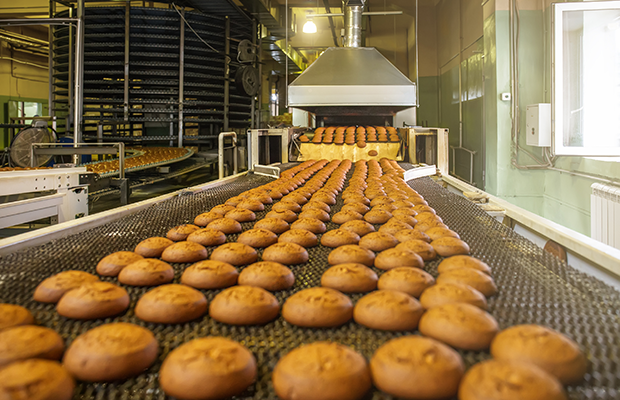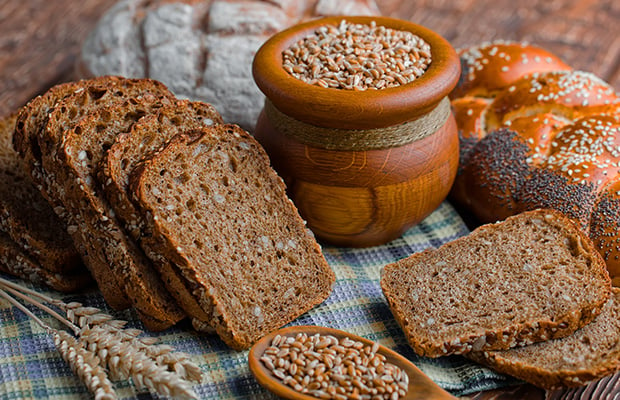
Ultra-processed foods: how bad are they for your health?
Our Senior Dietitian reveals how ultra-processed foods like ham and sausages, mass-produced bread, cereals and instant soups can affect your health, and simple ways to avoid them.



More than half of the energy (calories) an average person in the UK eats and drinks comes from ultra-processed foods. That’s perhaps not surprising as they can be convenient, appealing, and are heavily marketed to us. But researchers have shown that ultra-processed foods can impact our health.
So, what are ultra-processed foods and how can we avoid them?
What is ultra-processed food?
The term ‘ultra-processed foods’ comes from the NOVA food classification system, which was developed by researchers at the University of São Paulo, Brazil.
The system places food into 4 categories based on how much they have been processed during their production:
- Unprocessed or minimally processed foods: This includes produce such as fruit, vegetables, milk, fish, pulses, eggs, nuts and seeds that have no added ingredients and have been little altered from their natural state.
- Processed ingredients: This includes foods that are added to other foods rather than eaten by themselves, such as salt, sugar and oils.
- Processed foods: These are foods that are made by combining foods from groups 1 and 2, which are altered in a way that home cooks could do themselves. They include foods such as jam, pickles, tinned fruit and vegetables, homemade breads and cheeses.
- Ultra-processed foods: Ultra-processed foods typically have more than 1 ingredient that you never or rarely find in a kitchen. They also tend to include many additives and ingredients that are not typically used in home cooking, such as preservatives, emulsifiers, sweeteners, and artificial colours and flavours. These foods generally have a long shelf life.
A list of common ultra-processed foods
Examples of ultra-processed foods can include:
- ham and sausages
- mass-produced bread, breakfast cereals, instant soups
- crisps and biscuits
- ice cream and fruit-flavoured yogurts
- carbonated drinks and some alcoholic drinks including whisky, gin, and rum.
Why are ultra-processed foods bad for us?
Ultra-processed foods often contain high levels of saturated fat, salt and sugar and when we eat them, we leave less room in our diets for more nutritious foods. It’s also been suggested that the additives in these foods could be responsible for negative health effects.
The actual processing of the food could also make a difference to how our bodies respond to it. Studies have shown, for example, that when foods such as nuts are eaten whole the body absorbs less of the fat than when the nut is ground down and the oils are released. Another new theory is that diets higher in ultra-processed foods could also affect our gut health.
More research is needed to separate these different elements and understand exactly what about ultra-processed foods could be bad for our health: is it one of these elements or is it their combination?
Currently, it’s also hard to know whether it is something within the foods that is the issue or whether eating a diet high in these foods suggests an overall lifestyle that is linked to poorer health.
However, given the high salt, sugar, and saturated fat content of most of these foods, cutting down does seem sensible.
Want to get fit and healthy?
Sign up to our fortnightly Heart Matters newsletter to receive healthy recipes, new activity ideas, and expert tips for managing your health. Joining is free and takes 2 minutes.
I’d like to sign-upAre cereal and bread considered ultra-processed foods?
When you think of ultra-processed foods, you might think of chips, sweets, and colourful sugary drinks, but there are some less obvious examples.
Everyday items such as breakfast cereals and mass-produced or packaged bread can be considered ultra-processed foods. This is because they often have extra ingredients added during production, such as emulsifiers, sweeteners, and artificial colours and flavours.
One of the criticisms of the NOVA method of categorising foods is that foods like these, which can be part of a healthy diet, sit alongside less nutritious ultra-processed foods. Less nutritious ultra-processed foods can include pre-prepared meals, sausages and nuggets, as well as sweets, biscuits, pastries, buns, cakes and pre-prepared chips.
Plant-based meat and cheese substitutes are also ultra-processed, and so might not be as healthy as they are marketed to be.
Despite the problems with lumping different types of food together under the umbrella term ultra-processed, the NOVA system is still widely used in research. While there are pros and cons to using it, it’s helped establish a link between diets high in these foods and worse health.
Is cheese ultra-processed?
Most freshly-made dairy cheeses like Cheddar, Brie, mozzarella and Edam fall into the processed food category, because they have been made with methods such as pasteurisation, fermentation or ageing.
Cheeses that are ultra-processed include cheese slices, spreads, some shredded cheeses, and flavoured cheeses. They have been industrially processed and can typically contain added fats, sugars and salt, as well as ingredients we do not have at home, such as preservatives, sweeteners, emulsifiers, and artificial colourings.
Vegetarian and vegan cheeses can also be ultra-processed because of the ingredients and additives used to make them taste and feel like dairy cheese.
Cheese is a good source of calcium and protein and, in moderation, can be a healthy part of your diet.
To avoid ultra-processed foods, stick to traditional cheeses. For example, buying Cheddar in a large block and slicing it yourself is cheaper and healthier than buying pre-sliced options.
But keep in mind that cheese can be high in salt and saturated fat, so aim for a matchbox-sized portion (around 30g) per day to keep your intake in check.
- Read our guide on how to make a healthier cheeseboard.
Should I be cutting out ultra-processed foods?
It might sound like we should go back to eating only foods that are minimally processed, but with restricted time and budget, this is not an option for most of us.
Although the evidence to suggest that ultra-processed foods are bad for our heart and circulation seems to be growing, the type and quality of the research means it’s still not clear that we need to completely exclude them.
The Scientific Advisory Committee on Nutrition (SACN), who reviewed the evidence on processed foods and health in 2023, concluded that because of limitations to the research available caution is still needed when it comes to making dietary recommendations.
Instead of trying to completely cut out these foods, think about the balance in your diet. Make sure that there are minimally processed foods in there too – eat fruit and vegetables with your meals and drink water instead of sugary drinks – and try to fit in time over the week for home cooking.
It’s also important to remember that not all ultra-processed foods are equal. When you do include ultra-processed foods in your diet, choose those with more nutritional benefit – wholegrain bread and cereals or baked beans for example, instead of crisps, sweets or pizzas.
Get in the habit of reading food labels so you can easily identify and cut back on foods that are high in sugar, salt, or saturated fat.
- Read more about how food labelling works
- Explore our collection of heart-healthy recipes
How to cut down on ultra-processed foods
Eating a lot of processed foods leaves less room for healthier foods like fruit and vegetables, fish, unsaturated oils, pulses and nuts and seeds. So, if you want to change your diet, try to make some swaps, such as:
- Instead of flavoured yogurts with added sugar or sweeteners, choose plain yogurt and add your own chopped fresh, frozen or dried fruit for sweetness.
- Instead of buying sauces or ready meals, cook your favourites in larger amounts at home and freeze the extra in portions to use another day.
- Have porridge in the morning with fruit and nuts instead of sugary low-fibre breakfast cereals.
- Eat fresh, baked or stewed fruit instead of shop-bought fruit pies or cakes.
- Have some nuts instead of biscuits with your afternoon cuppa.
Tried to cut back?
Let us know how you got on or any tips you might have cutting back on ultra-processed foods. Email your thoughts and any photos for a chance to be featured in the next magazine.
The latest research on ultra-processed foods and heart health
Several studies have shown that eating higher amounts of ultra-processed foods is linked to a greater risk of:
- high blood pressure
- cardiovascular disease
- heart attacks and strokes
- early death.
One study, presented at the European Society of Cardiology Congress in August 2023, tracked 10,000 Australian women for 15 years. Those with the highest amounts of ultra-processed food in their diet were 39 per cent more likely to develop high blood pressure than those with the lowest.
Another larger analysis, also presented at the meeting, looked at 10 studies involving more than 325,000 men and women. It showed that those who ate the most ultra-processed food were 24 per cent more likely to experience serious heart and circulatory events including heart attacks, strokes and angina. Each 10 percent rise in daily intake of ultra-processed food was linked with a 6 per cent increase in heart disease risk.
A study from 2019, which followed 19,899 university graduates in Spain, also showed a connection between ultra-processed foods and risk of early death. Participants were split into groups depending on their level of ultra-processed food intake. The group eating the fewest ultra-processed foods ate less than 2 servings per day, and the group eating the most ate more than 4 servings per day. People in the highest intake group were 62 per cent more likely to have died after an average of 10.4 years than people in the low consumption group.
These 3 studies were observational, meaning they can only find associations between factors. They cannot prove that ultra-processed foods directly cause negative health outcomes like heart disease; it’s possible that other factors could be responsible for the association.
In the Spanish and Australian studies, the researchers found the same increased risks after taking into consideration other aspects of people’s diets, such as their saturated fat, salt and sugar intake. This suggests the processing itself may be harmful rather than the higher fat, salt and sugar levels.
BHF Senior Dietitian Victoria Taylor said: “It’s important to remember that observational studies like these can only show an association. They cannot tell us what is behind this. The classification of ultra-processed foods used by the researchers is very broad and so there could be a number of reasons why these foods are being linked to increased risk to our health, for example nutritional content, additives in food or other factors in a person’s life. Before we consider making any changes to advice or policy it is important to understand this thoroughly."
"We already recommend people adopt a Mediterranean-style diet, which includes plenty of minimally or unprocessed foods such as fruit, vegetables, fish, nuts and seeds, beans, lentils and wholegrains. This, along with exercising regularly and not smoking, has been shown to be beneficial for lowering risk of heart and circulatory disease.”
What to read next...

Donate today






